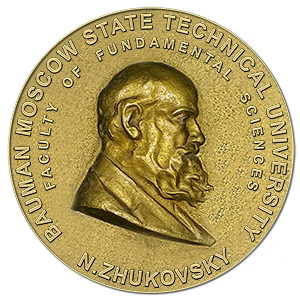
In order to encourage research in mathematics, the Bauman Moscow State Technical University held its annual competition for the best papers in mathematics among those published in 2023 by the BMSTU staff.
After much deliberation, the winners and top rankings for the papers in mathematics were determined as follows:
1st place for the best scientific publication in mathematics in 2023
Zarubin Vladimir Stepanovich, Professor, FN-2 Department
Novozhilova Olga Valerievna, Associate Professor, FN-2 Department
for the paper "Two-sided estimate of effective thermal conductivity coefficients of a textured composite with anisotropic ellipsoidal inclusions", published in "Zeitschrift für angewandte Mathematik und Physik" (Q1, Scopus).
The major finding of the study is developing a method for calculating two-sided estimates of the effective thermal conductivity tensor components for a textured composite, based on a mathematical model of thermal energy transfer in a composite featuring anisotropic inclusions in the form of triaxial ellipsoids.
This approach uses the dual variational formulation of the problem of steady-state thermal conductivity in an inhomogeneous body. The paper considers anisotropic inclusions that have the form of triaxial ellipsoids, when the main axes of their thermal conductivity tensors coincide with their geometrical axes. We present an example of calculating two-sided estimates for a conical composite texture.
The method developed by the authors may be used to assess the possible error in predicting effective thermal conductivity coefficients for composites modified by nanostructural elements (including carbon nanotubes).
The remaining top rankings in the 2023 competition for the best scientific publication in mathematics include:
2nd place
Kanatnikov Anatoly Nikolaevich, Professor, FN-12 Department
for the paper "Cancer cell eradication in a 6D metastatic tumor model with time delay" in "Communications in Nonlinear Science and Numerical Simulation" (Q1, Scopus).
The major finding of the study comprises a qualitative analysis of a nonlinear six-dimensional system with a delay, said system describing the process concerning a metastatic tumor with a one-time chemotherapy delay. To solve this problem, the authors applied the method of invariant set localization for nonlinear systems, in particular. This method, coupled with analysis of the explicit system, made it possible to determine the boundaries within which the main system parameters can vary (the number of infected and healthy cells of different types), to find the equilibrium points of the system and to analyze their stability.
Then, using the cascade structure of the entire system and the properties of asymptotically autonomous and competitive systems, the authors obtained the conditions for tumor clearance in the secondary site under the assumption that cancer cells in the primary site are asymptotically eradicated. Based on these results, the authors obtained the cancer eradication conditions for the entire system.
This study is of interest both in terms of applying original methods of nonlinear dynamic system analysis, in particular constant-delay systems (as it is difficult to analyze the stability of such systems and to determine invariant sets), and in terms of its practical application (important results were obtained for qualitative analysis of chemotherapy methods).
3rd place
Rudakov Igor Alekseevich, Professor, FN-2 Department
for the paper "Infinitely many periodic solutions for the quasi-linear Euler-Bernoulli beam equation with fixed ends" in "Calculus of Variations and Partial Differential Equations" (Q1, Scopus).
The major finding of the study is a theorem on the existence of an unbounded sequence of periodic solutions for the Euler-Bernoulli equation with an arbitrary right-hand side for the case when the nonlinear term grows according to a power law. The variational method is used to prove the theorem. The solutions are obtained as critical points of the respective functional. Due to the fact that the right-hand side is present in the equation, this functional is not even, which precludes application of the critical point theory for even functionals. Therefore, the authors replace this functional with a modified functional, which allows them to use topological methods to derive an unbounded sequence of saddle points, which, in turn, yields the solutions to the original problem.
The method developed by the authors also made it possible to significantly weaken the conditions imposed on the nonlinear term in previously published papers. Here, it is not required to be monotone or homogeneous.
In addition, the paper provides a method for investigating the Sturm-Liouville problem which makes it possible to obtain finer estimates of eigenvalues. This method may be used to investigate many similar problems with varied boundary conditions.
Congratulations to the winners!















